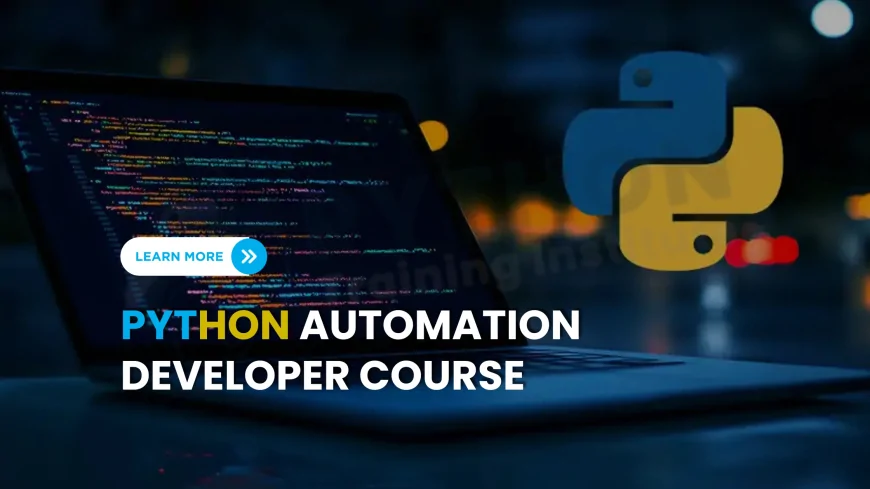Python Automation Developer Training Pune | Certified Python Automation Developer Course Pune
Join Python Automation Developer Training in Pune to master real-time scripting, Selenium, API testing, and DevOps automation. Includes hands-on projects, certification, and placement support.

Table of Contents
- Why Learn Python for Automation?
- Who Should Join?
- Course Structure
- Key Skills Covered
- Automation Tools Taught
- Real-Time Project Exposure
- Certification Details
- Placement and Career Support
- Salary Expectation After Course
- Top Institutes Offering Training in Pune
- Online & Hybrid Training Options
- Course Duration & Fee Structure
- Job Roles After Completion
- Weekend & Evening Batch Options
- Internship Opportunities
- Corporate Training Solutions
- Student Success Stories
- Compare with General Python Courses
- Portfolio Development
- FAQs
- Conclusion
Why Learn Python for Automation?
Python is a top choice for automation due to its simplicity, cross-platform support, and vast library ecosystem. From automating daily business tasks to complex IT workflows, Python enables developers to build scalable, efficient automation scripts in record time.
Who Should Join?
- Fresh graduates looking for tech careers
- Working professionals in IT, QA, DevOps, or data
- Manual testers wanting to shift to automation
- System admins or support engineers seeking upskilling
Course Structure
The training programs in Pune are structured to deliver knowledge in an accelerated yet comprehensive manner. A typical structure includes:
- Module 1: Python Basics & Control Structures
- Module 2: Functions, OOPs, File Handling
- Module 3: Regular Expressions and Error Handling
- Module 4: Web Scraping and Selenium Automation
- Module 5: Working with APIs and JSON
- Module 6: Git, CI/CD, and Automation Frameworks
Key Skills Covered
- Python Scripting
- Task Automation (files, folders, reports)
- Web Scraping
- Selenium WebDriver Automation
- API Automation
- Git/GitHub for version control
- Continuous Integration and Testing Automation
Automation Tools Taught
- PyAutoGUI
- Selenium
- BeautifulSoup
- Postman / Requests
- Jenkins
- Jupyter Notebook
- GitHub
Real-Time Project Exposure
Hands-on projects are core to automation training in Pune. Examples include:
- Automated web login and form submission
- Email and Excel report automation
- Bulk file renaming script
- Web scraping for data aggregation
Certification Details
Post-training, students receive industry-recognized certificates. Some courses are also aligned with global certifications like Microsoft, Google, or AWS associate levels.
Placement and Career Support
Leading institutes in Pune offer resume workshops, mock interviews, job referrals, and internship tie-ups with tech companies. Career counselors assist learners in cracking technical interviews with confidence.
Salary Expectation After Course
Entry-level Python Automation Developers in Pune earn between ₹4 to ₹6 LPA. With 2+ years of experience and project exposure, salaries rise up to ₹12 LPA or more.
Top Institutes Offering Training in Pune
WebAsha Technologies
Located in Wadgaon Sheri, Pune, WebAsha Technologies is a leader in hands-on Python training with a strong focus on automation:
-
Comprehensive Curriculum: Covers Python fundamentals through advanced automation topics—web scraping, Selenium, API testing, and DevOps tools like Git and Jenkins.
-
Live Projects & Case Studies: Students work on real-world automation scripts and scenario simulations.
-
Job-Oriented Training & Placement Support: Boasts 90%+ placement success, with over 1500+ alumni placed; dedicated sessions for resume-building and mock interviews.
-
Learning Flexibility: Offers small, interactive batches, flexible schedules, online/offline modes, and personalized mentorship.
-
Certification: Globally recognized curriculum with an official certification exam and free re-sitting option.
Online & Hybrid Training Options
Many of the above institutes offer flexible online classes, including live instructor-led sessions, LMS content, and weekend webinars to help remote learners or working professionals.
Course Duration & Fee Structure
- Duration: 6 to 12 weeks
- Mode: Weekday, Weekend, Online
- Fee: ₹8,000 – ₹18,000 (EMI & scholarships available)
Job Roles After Completion
- Python Automation Developer
- QA Automation Engineer
- SDET
- DevOps Automation Engineer
- API Tester
Weekend & Evening Batch Options
For professionals, weekend and evening options offer convenience without career disruption. These batches include recorded sessions, live support, and one-on-one mentorship.
Internship Opportunities
Several training providers partner with startups and SMEs to provide hands-on internships, which often lead to job offers. Students can work on real-time automation modules under expert supervision.
Corporate Training Solutions
Companies looking to train in-house teams on Python automation can opt for WebAsha’s tailored corporate training packages, delivered onsite or virtually.
Student Success Stories
Graduates from these programs have secured jobs in TCS, Infosys, Cognizant, as well as tech startups. Many professionals have transitioned from manual testing to automation roles successfully.
Compare with General Python Courses
General Python courses focus on basics, while automation training emphasizes real-world tools, testing, DevOps, and scripting workflows for business processes. It's ideal for job-ready specialization.
Portfolio Development
Students build GitHub portfolios with scripts, automation workflows, and web apps that can be shared with employers during interviews, demonstrating real-world capabilities.
Frequently Asked Questions (FAQs)
1. What is Python automation used for?
Python automation is used to automate repetitive tasks like file handling, data scraping, report generation, software testing, and DevOps processes using scripts and tools.
2. Who should enroll in Python automation training?
Freshers, manual testers, QA professionals, system administrators, and developers who want to upskill in scripting and automation can benefit from this course.
3. Do I need prior coding experience to join?
No. Most institutes in Pune offer beginner-friendly modules starting from Python basics to advanced automation topics.
4. What are the key tools taught in this training?
Common tools include Selenium, PyAutoGUI, Requests, Postman, Jenkins, Git, BeautifulSoup, and Jupyter Notebook.
5. How long does it take to complete the course?
Typically, 6 to 12 weeks depending on batch type—fast-track, weekday, weekend, or online formats.
6. Will I receive a certificate after completion?
Yes, most reputed institutes like WebAsha Technologies provide globally accepted course completion certificates.
7. Can I take this course online from Pune?
Yes, hybrid and fully online formats are available with live sessions, recorded lectures, and online project submissions.
8. Are real-time projects included in the training?
Absolutely. You’ll work on live automation projects such as web scraping bots, test automation suites, and reporting tools.
9. What kind of job roles can I apply for?
You can apply for roles like Python Automation Developer, QA Automation Engineer, SDET, and DevOps Automation Specialist.
10. What is the salary range after completing this course?
Beginners can earn ₹4–6 LPA, while experienced professionals can reach ₹10–15 LPA based on project experience and skills.
11. Which institute in Pune is best for this training?
Top-rated options include WebAsha Technologies.
12. Is placement support provided after the course?
Yes, most institutes offer placement assistance with resume building, mock interviews, and job referrals in Pune and other cities.
13. Can I transition from manual testing to automation through this course?
Yes, many manual testers use this course to move into high-demand automation and SDET roles.
14. Will I learn test case writing and automation frameworks?
Yes, frameworks like PyTest and unittest are covered, along with structured test case development and execution.
15. Do these courses include API testing?
Yes. REST API automation using Python with tools like Requests and Postman is a key module in most courses.
16. Is there a weekend batch option available?
Yes. Many institutes offer weekend and evening batches specifically for working professionals.
17. What are some of the automation projects I’ll work on?
Projects include login automation, web scraping, Excel and email automation, and creating CLI utilities in Python.
18. Will I learn how to use Git and version control?
Yes, Git and GitHub are integral parts of the course to help you manage and showcase your code professionally.
19. Can I showcase my projects to employers?
Yes. You’ll build a GitHub portfolio with your automation scripts and projects, making your resume stand out.
20. What is the future scope of Python automation?
Python automation is in high demand across industries like IT, finance, logistics, and healthcare—making it a future-proof career path.
Conclusion
Python automation is no longer a niche skill—it's a mainstream necessity across IT, QA, DevOps, and data-driven roles. With Pune being a major tech hub, learning automation with Python can open doors to countless job opportunities, faster task execution, and high-paying roles.
Whether you’re a fresher, software tester, system admin, or DevOps enthusiast, enrolling in a Python Automation Developer Training program in Pune can accelerate your career trajectory. These programs offer hands-on projects, expert mentorship, internship options, and industry-recognized certifications—all tailored for real-world job readiness.
Institutes like WebAsha Technologies provide structured curriculums, flexible batch timings, placement assistance, and lifelong access to course content. If you're serious about future-proofing your career, now is the time to automate your learning—and your future—with Python.
Don’t wait. Start scripting your success story today with Python automation!
What's Your Reaction?
 Like
0
Like
0
 Dislike
0
Dislike
0
 Love
0
Love
0
 Funny
0
Funny
0
 Angry
0
Angry
0
 Sad
0
Sad
0
 Wow
0
Wow
0















